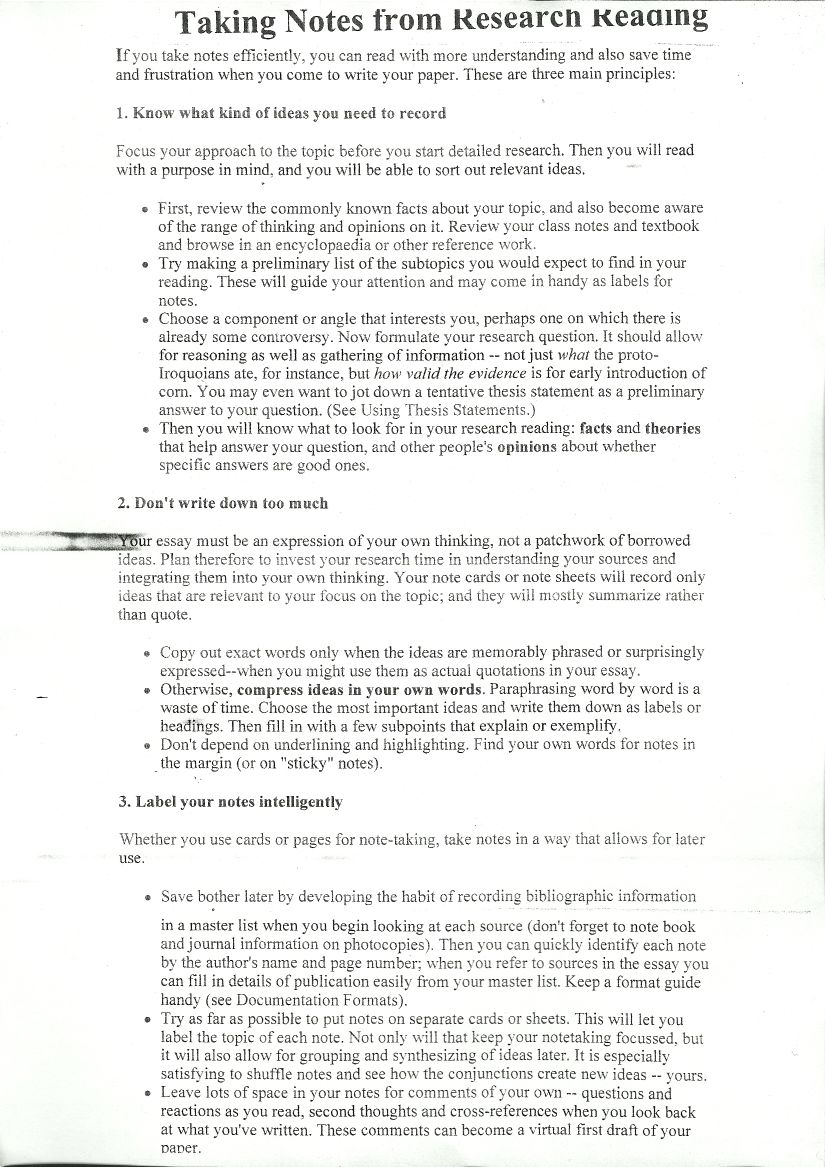Davies0003

Taking Notes from Kesearcn Keaaing
If you take notes efficiently, you can read with morę understanding and also save time and frustration when you come to write your paper. These are three main principles:
1. Know what kind of ideas you need to record
Focus your approach to the topie before you start detailed research. Then you will read with a purpose in mind, and you will be able to sort out relevant ideas.
• First, review the commonly known facts about your topie, and also become aware of the rangę of thinking and opinions on it. Review your class notes and textbook and browse in an encyclopaedia or other reference work.
• Try making a preliminary list of the subtopics you would expect to find in your reading. These will guide your attention and may come in handy as labels for notes.
• Choose a component or angle that interests you, perhaps one on which there is already some comroversy. Now formulate your research question. It should allow for reasoning as well as gathering of information - not just what the proto-Iroąuoians ate, for instance, but how valid the evidence is for early introduction of com. You may even want to jot down a tentative thesis statement as a preliminary answer to your question. (See Using Thesis Statemcnts.)
• Then you will know what to look for in your research reading: facts and theories that help answer your question, and other people's opinions about whether specific answers are good ones.
2. l)on't write down too much

Itr essay must be an expression of your own thinking, not a patchwork of borrowed ideas. Plan thereforc to invest your research time in understanding your sources and integrating them into your own thinking. Your notę cards or notę sheets will record only ideas that are relevant to your focus on the topie; and they will mostly summarize ralher than ąuote.
Wyszukiwarka
Podobne podstrony:
SQL nodes. If you compile MySQL with clustering support, and perform the default installation (using
Installing MySQL Proxy from a Binary Distribution If you download a binary package, you must extract
ilienvault■ creators of ossirr7 Troubleshooting 7.1 How to check if you have a connection with the W
If you have a problem with something you’ve bought, or with the semce in a shop, do you usually comp
If You Can Find It,You Gan Bead It Feofured inside: Mom łon 30 irw»cvotive idees fot recl.kx«, btoce
cw0014 Q Mark each verb (I) if you can use it to complete sentence a, (T) II you i an use it to comp
UHAM087 70 ^ UNDERSTANDING HEADACHES AND M I G RAI N ES they ever feel really relaxed is when they a
55093 mbs 107 MY HRKATHLYC. SYSTKM If you can run the last bit without breathing at all, so much thc
ZDIĘCIA0086 I Mn report a tUcft nnd dcstribc what w«u stolcu. Greet the person. Ask if you can help.
MOVE OUT OF YOURCOMFORTZONE You can only grow if you are willing to feel awkward and uncomforta
motivational poster cosplay horrible warning COSPLAY Because Mama always said, "If you can t be
więcej podobnych podstron